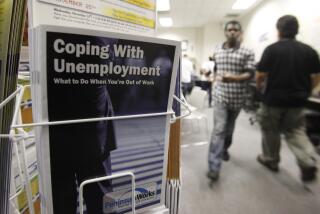His Personnel Director Is Up for Hire : File Cabinet-Size Resource System Marketed for Small Firms
- Share via
Pat Dillon’s new Personnel Director is highly organized, always has all the right forms and never calls in sick.
The Personnel Director also has ball-bearing wheels and can be moved easily from room to room at a busy company.
Dillon is the founder, president and sole employee of Personnel Products & Services Inc. of Santa Ana, developer of a filing cabinet-size personnel system that provides all the forms, manuals and references necessary to handle a small company’s personnel matters.
“It’s a complete resource system,” he said.
At first glance, the Personnel Director is merely two drawers of tabbed files accompanied by a manual. But a closer look shows it to be a distillation of volumes of regulations that larger companies typically have in a personnel department.
Because small companies often neglect such matters or simply do not have the resources for even a personnel director, Dillon hopes his system will be a boon in Southern California, where start-up, entrepreneurial ventures abound.
So far, a year after he began marketing efforts, Dillon has sold about 25 Personnel Directors. Customers seem to like the system.
“It’s well organized (and) steers me in the right direction for other information I need,” said Elaine Wheeler, manager of industrial relations at Energy Systems Associates of Tustin, an energy consultant.
At the core of the Personnel Director is a 600-page manual that directs the user to the appropriate file.
Necessary personnel forms are in the top drawer, with reference files and explanatory information for each form in the bottom drawer.
The top drawer, for instance, has a file on unemployment insurance forms and the bottom drawer has a file that tells the employer how to calculate the payments due to the government. In many instances, Dillon said, companies can reduce the rates they pay in unemployment insurance, workers compensation and other areas if they understand the regulations and know what steps to take to reduce their costs.
In addition, the system summarizes the thicket of regulations that deal with overtime, recruitment, disciplinary policies and employee evaluations.
His system carries a $3,000 first-year price tag with an optional $300 service fee for each succeeding year--”dirt-cheap,” he figures, compared to the cost of hiring a personnel service or an employee with enough expertise to be knowledgeable in all the areas his system covers.
In addition to the forms and manuals, buyers of the system get newsletters from Dillon summarizing changes in regulations and new laws. Dillon also provides his customers with access to lawyers and other specialists he retains expressly to answer questions and provide explanations.
The Personnel Director “is a tool for quick, easy answers,” said Dillon.
Newport Components Inc., a Newport Beach electronics broker, uses a Personnel Director to service its 30 employees. “We use it all the time,” said Pat Ralg, an administrative assistant, explaining that the company does not have the staff to devote full-time attention to personnel matters.
Dillon figures that the Personnel Director not only helps a small company organize a solid human relations function, but helps prevent potentially costly problems, such as lawsuits.
Wrongful discharge suits are a growth industry, he explains, and small companies are particularly vulnerable because their personnel practices tend to be informal and thus open to wide interpretation.
Dillon cited a Northern California law firm that as recently as two years ago was principally concerned with labor relations and unions. Today, two-thirds of the firm’s work involves wrongful discharge actions.
Selling his Personnel Director to companies that have been burned in such an action “is a slam-dunk,” Dillon said.
However, he acknowledges that most small companies are preoccupied with getting their products out the back door and not with proper personnel practices.
Dillon’s journey with the Personnel Director also illustrates the entrepreneur’s often difficult and frequently uncertain course.
After losing his job at Costa Mesa-based MSI Data Corp. in 1983 when the company trimmed its human relations staff, Dillon and a partner, Gerald Elliott, invested about $30,000 each in developing the Personnel Director.
Elliott operates a separate computer-consulting and data-processing concern in Santa Ana and provides office space and logistics support for PPSI.
Propelled by the belief that such a system would work, Dillon spent two years researching and crafting his venture. Along the way, he had to simplify such melodious federalese as “ . . . conciliation agreements give legal sanction to the institutionalization of the imaginary picket line” into easy-to-understand prose.
Federal labor regulations “are written by lawyers for lawyers,” he said.
Although he is now in his third year without any direct income, Dillon says he has no regrets, and his belief in the Personnel Director appears to be unshaken. “Being independent, I’ve learned to love the freedom, although I work harder,” he said. “I’m my own man.”
More to Read
Inside the business of entertainment
The Wide Shot brings you news, analysis and insights on everything from streaming wars to production — and what it all means for the future.
You may occasionally receive promotional content from the Los Angeles Times.









